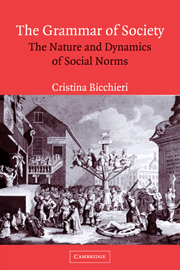6 - The Evolution of a Fairness Norm
Published online by Cambridge University Press: 05 June 2012
Summary
Introduction
The example I used in the previous chapter is that of the emergence of a drinking norm. Such a norm is typically descriptive, though in some situations even such an irrelevant behavior may come to signify allegiance to a particular group, not unlike the rules of etiquette I described in Chapter 1. When what started as a descriptive norm acquires some ulterior significance, when people start attributing value to it and believe they are expected by others to follow the group norm, it becomes a social norm. Probably many group norms that fulfill a signaling or exclusionary function were born as descriptive norms. Teenage groups are an example: Their dress codes may have emerged by chance, but soon enough they become imbued with meaning and value.
Not all social norms, however, stem from descriptive norms. In particular, the pro-social norms I am interested in seem to partake of a very different origin. Norms of cooperation, promise-keeping, reciprocity, or fairness are some of the institutions that allow a society to function smoothly, if not exist. The problem of social order, its origin and maintenance, has traditionally been associated with the existence of pro-social behaviors. If, as I am, one is interested in the spontaneous emergence of such order, then a central question becomes how to model the emergence of those behavioral patterns that keep a society together. There is, however, a difference in pro-social norms as to their importance for society's survival.
- Type
- Chapter
- Information
- The Grammar of SocietyThe Nature and Dynamics of Social Norms, pp. 214 - 234Publisher: Cambridge University PressPrint publication year: 2005



